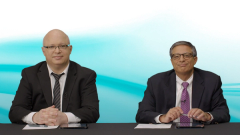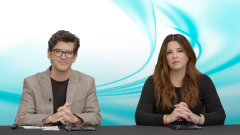
Earlier Use of Novel Therapeutics in Multiple Myeloma Treatment Pathways
Explore the potential in earlier use of novel therapy in multiple myeloma, including immunotherapy, bispecifics, and CAR-T therapies, with promising responses and potential paradigm shifts.
Episodes in this series

Transcript:
Sagar Lonial, MD, FACP: And these 3 studies that you described are older. So what are you excited about in the context of early relapse data? [What are] concepts [and] trials that may be coming out that we can all anticipate?
Cesar Rodriguez, MD: The thing that everybody is excited about is immunotherapy [and] bispecifics earlier on and CAR [T-cell therapy]. We have a lot of clinical trials on 1 to 3 prior lines of therapy for bispecifics as a single agent or in combination. And we also have data on CAR [T-cell therapy]. So that’s getting us more excited because the responses that we’re seeing are phenomenal.
Luciano Costa, MD: I agree. We have this chronological hierarchy in myeloma. We tend to think that the things that came last have to be fit last. But we saw, for example, the CARTITUDE-4 [NCT04181827] data where [in] the population who is mostly not exposed to CD38 monoclonal antibody, you see a benefit of CAR [T-cell therapy] in the early line of therapy, even in people who have not been exposed.… So that’s paradigm challenging.
It’s not paradigm changing because the availability and the access remain an issue. And there’s now a family of trials of bispecifics that are challenging CD38 combinations in early relapses. Perhaps the one that is further along is MajesTEC-3 [NCT05083169], which has potential to change this landscape of early relapse.
Sagar Lonial, MD, FACP: Donna, you want to add anything?
Donna Catamero, NP: I agree. I’m excited about the immunotherapy moving into earlier lines. We see patients doing so well with deep and durable responses. And we’re able to mitigate a lot of those adverse effects that they’re experiencing. So I’m excited for these treatments moving further up line.
Cesar Rodriguez, MD: And it seems to make sense. We have the idea of wanting to use the best therapies earlier on or up front because the attrition rate and relapse are very significant. So the fact that we’re starting to use these earlier on is good. It’s positive. Is it going to be replacing the anti-CD38? We’ll find out soon enough, but it seems like it might be.
Transcript is AI generated and edited for readability.
Newsletter
Stay up to date on recent advances in the multidisciplinary approach to cancer.







































